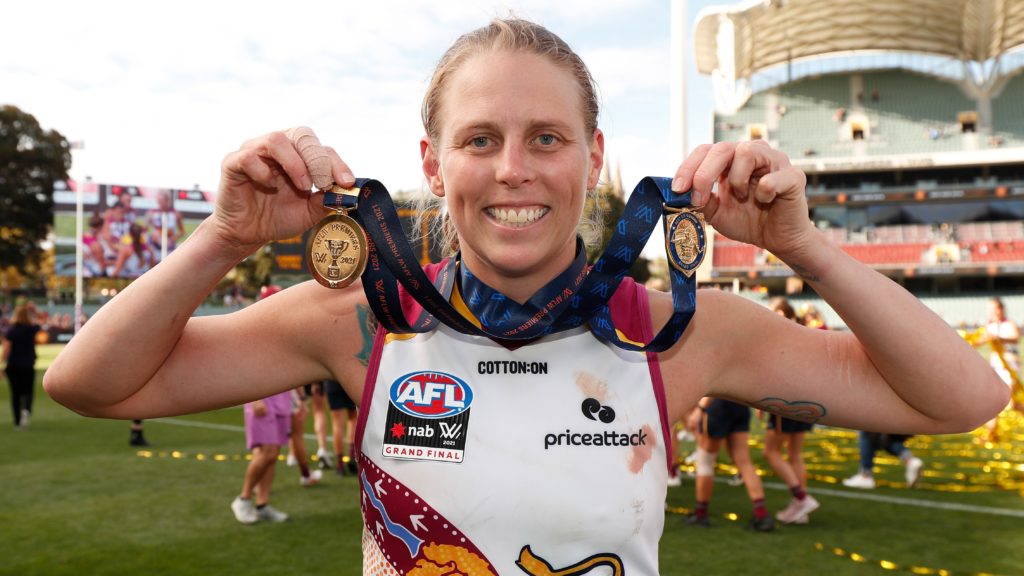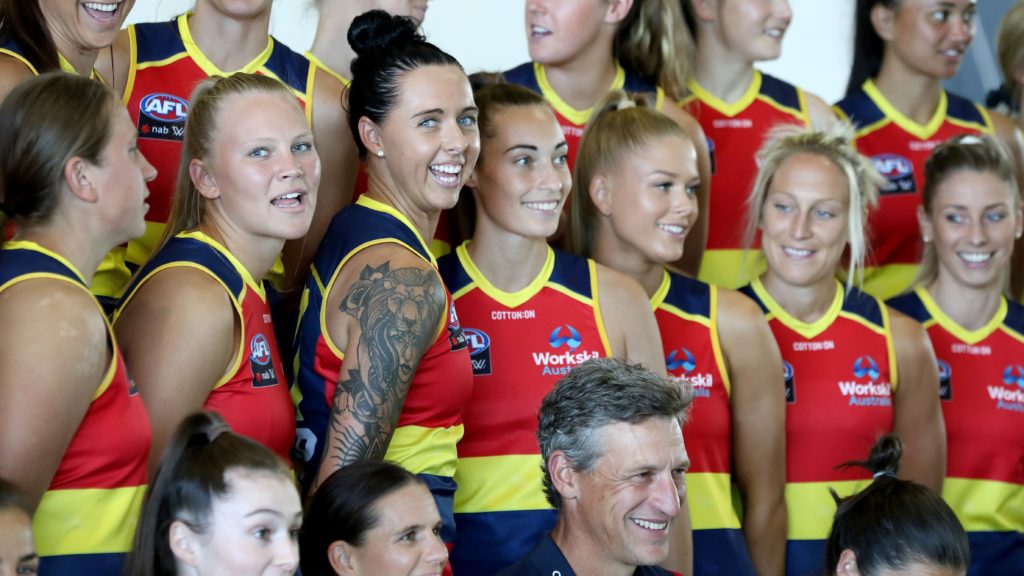Anzac Day and football share a tight bond.
Since 1995, Collingwood and Essendon have faced off at Melbourne’s colosseum, uniting Australians in an effort to pay respects to the men and women who served and continue to serve the country.
And for Rhiannon Metcalfe, links between Anzac Day and footy extend far beyond the resonant roars of the MCG.
Metcalfe, an Adelaide Crows premiership player who transferred from the navy to join the military police personnel in the air force in 2018, ignited a passion for football when she played in games organised by the Australian Defence Force (ADF).
“Every year, we go down to Victoria and play each of the armed service units,” Metcalfe explained.
“From those games, the ADF Football Association picks an ADF all-stars team, which then a few weeks later go down over Anzac Day and participate in the Anzac clash.”
The match, annually staged on the 24th of April, was where Metcalfe unearthed her talent and zeal for the game. Eventually, the AFLW competition was born.
“I was like, ‘Oh, I’ll give this a go and see what happens’,” Metcalfe recalled.
What happened? A year later, she was lining up at centre bounces to ruck for the Crows, and became a premiership player in the league’s inaugural season.
She’s not the only AFLW player to hail from an ADF background either.

Premiership Lion Kate Lutkins, predominantly a transport driver providing logistical support to the army, speaks just as glowingly of her own defence force football roots.
“In my first year in the army, I got to play army AFL and then ADF AFL, and that was the best three weeks of my life at that point,” Lutkins said.
“The camaraderie, everyone is there for the same reason, you all have this special connection through the defence force. You come together and you have the best few weeks of your life.”
Like Metcalfe, Lutkins’ talents on the field were recognised with selection in the ADF’s representative side.
“That was really special, playing alongside and representing the ADF,” she reflected.
“Even though it’s only one game a year, for me personally it’s on par with the AFLW. It’s so special to me, and it’s with a group of people that you just have so much in common with and you share this unique experience with. I have so much pride when I play that ADF game every year.
“It’s a huge honour to play around that time of year and to represent the ADF around that time, given the ADF’s history with those that have fallen and those that are still serving. You’re playing with that extra bit in your heart.”
Recently, Lutkins has worked with the ADF’s career promotions team, staging speeches across Brisbane on the benefits of joining the defence force. For someone who once feared any form of public speaking, it’s a remarkable development.
“When I joined, I didn’t do public speaking, I hated it,” the 32-year-old explained. “I would literally run away from the microphone, or any moment that would push me out of my comfort zone. The ADF has pushed me out of my comfort zone so many times that it’s developed my mental resilience to be able to push through the uncomfortable.”
It explains how Lutkins, with a torn plantar fascia in her left foot, endured significant duress to not only play out last week’s grand final, but also be adjudged the best player on the ground. In fact, it was revealed post-match that Lutkins had suffered the injury a month prior, in round eight.
“[In the army] you’ll be doing a three-day food and sleep deprivation, and you know you’ve just got to push through because if you don’t keep going, you’re going to hurt your teammates. They’re relying on you and you are relying on them to keep going. It makes you realise how far you can push your body, mentally and physically,” she said.

Metcalfe credits the ADF for developing her time management skills, as well as effective communication and leadership, which are traits she has implemented onto the football field.
But being a professional footballer has also supplied her with lessons she applies into her work in the ADF, too.
“Realistically, the way I see it is they’re both careers that are team environments where you’re trying to achieve an overall goal,” she said.
“It’s not only what attributes the ADF has brought to my football career, but also what football has taught me and how I can bring that into my workplace.
“My current profession being military police, that’s taught me to think outside the box. We’ve had different little tasks throughout the last five years with footy teams, and I think it’s taught me to put a bit of a spin on things.”
Appreciative of the flexibility afforded to her by the ADF, the 29-year-old has been allowed to forge together an impressive five-season career.
“I’ve always been so grateful for the support the ADF has provided in juggling a full-time ADF career and playing for the Adelaide Crows. I’ve had conversations over the years with other AFLW players and their employer isn’t as supportive, which definitely puts into perspective how lucky I’ve been.”
According to the Chair of the ADF Australian Rules Association, Brigadier Dave Smith, the contribution that Australian Rules makes to ADF capability cannot be overstated.
“By providing the maximum number of opportunities for ADF members to play Australia’s game via our men’s, women’s, indigenous and wheelchair AFL programs, we build teamwork and resilience, while reinforcing Defence’s values of service, courage, respect, integrity and excellence,” he said.
“Our varied programs and strong backing of elite ADF sportspeople such as Rhiannon and Kate also support recruiting, retention and diversity and allow us to engage directly and in a meaningful way with the Australian community through our highly valued partnerships across the AFL.”
Anzac Day football, whether Collingwood against Essendon or the navy against the air force, continues to discover new talent and yield fascinating footy stories.
But primarily, it offers a chance to acknowledge the spirted efforts — both historical and ongoing — of ADF members.
For Metcalfe, the two go hand-in-hand.
“Whether it was the participation in the Anzac Day clash, representing the ADF playing football, for a few years we attended the Anzac Day match at the MCG, and as the ADF team we would go to dawn services together.
“For me, Anzac Day is for remembrance and appreciation. It’s a day to remember all the ADF members who, throughout their service, lost their life or carried wounds, either physically or psychologically, in order to allow us to live in this beautiful country that we do.”
